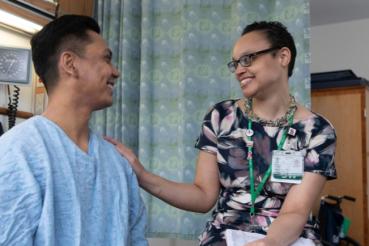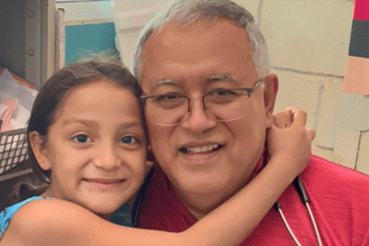Four Rush University students have been named Chicago Area Schweitzer Fellows as part of a yearlong service learning program that helps aspiring health professionals direct innovative community service projects. Yetunde Osakue-Allison (College of Nursing), Emmalynne Pytlowany (College of Health Sciences), Kayla Schmittau (Rush Medical College) and Courtney Severin (Rush Medical College) are among this year’s group of 28 graduate students who proposed impactful, community-based projects to address the health needs of underserved Chicagoans.
Named in honor of famed humanitarian and Nobel laureate Albert Schweitzer, MD, PhD, the Chicago Area Schweitzer Fellowship program encourages students to become lifelong leaders in service by helping to address unmet health needs among vulnerable Chicago residents. In collaboration with existing community organizations, each fellow will launch a community-based project and provide 200 hours of service.
Using a broad public health lens, the new fellows will work to improve community well-being and target social determinants of health — the conditions in which people are born, grow, live, work and age that have a profound impact on health and quality of life. The Rush Schweitzer Fellows are planning the following community projects:
- Yetunde Osakue-Allison will initiate sex education workshops for at-risk teenage African American girls at the Chicago Youth Programs in Washington Park. These workshops will provide them with a social support structure.
“Community health is near and dear to my heart. I plan to create a space for the youths where they can learn about healthy relationships, basic personal finance, being Black in America, and mental health and wellness. This will help give them a much-needed head start in life while also giving me skills I can carry with me as I begin my nursing career.”
- Emmalynne Pytlowany plans to develop and implement a social empowerment cohort for underserved students at UIC College Prep High School. This group will equip students to discuss mental health, promote awareness about mental wellness, and become leaders for mental health in their communities.
“The Schweitzer Fellowship provides such a unique experience for graduate students to pioneer change in their immediate communities,” says Pytlowany, a physician assistant student. “I knew it would teach me about public health in a direct and practical way, which will ultimately enhance my ability to comprehensively treat my patients in the future.”
- Kayla Schmittau will expand health education at Grace House, a residential program that helps women prepare for their future after exiting the Illinois prison system. The project will also provide literature, writing and art exercises as a therapeutic outlet for processing experiences and developing a positive self-image.
“The freedom to pursue health and well-being is a human right,” Schmittau says. “Health is the product of not only medical care but also the ability to access and comprehend it. My project aims to provide an opportunity for women exiting the Illinois prison system to develop health literacy skills so they may be empowered agents of health for themselves and their families.”
- Courtney Severin was selected as this year’s Bob and Caryle Perlman Fellow in honor of two Schweitzer Fellows supporters. She plans to help The Night Ministry Street Medicine program serve the homeless population by collaborating with emergency department personnel to create a trauma-informed protocol for the care of this population in the emergency department. The interventions will help improve the relationship between people without housing and the health care system, and improve long-term health.
“The homeless population is disproportionately overlooked by the health care system and often viewed as a burden,” Severin says. “I hope to not only serve them but give them voice in their own medical care. I am honored to be a Schweitzer Fellow and be provided with such a strong network of support to help me grow as an advocate and activist in underserved communities.”
The fellows were selected through a highly competitive application process. In addition to their service projects, the they will participate in a 13-month program that includes monthly meetings, trainings and ongoing opportunities for interdisciplinary collaboration, as well as support from a team of mentors from Rush and project sites.
The new fellows join a network of more than 600 Chicago program alumni who have provided over 120,000 hours of community service to community groups during the 20-plus years since the program began.
Learn more about the fellows and their service projects.




